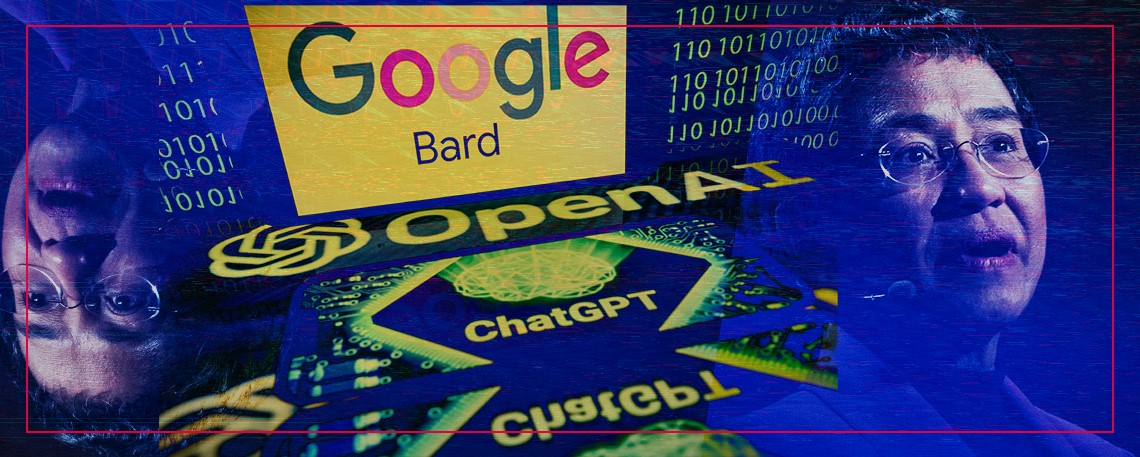Since the announcement by Reporters Without Borders (RSF) of the AI Charter in media project, 10 individuals have joined the committee, made up of experts in journalism and information technology. The number of partner organisations has expanded to 16. The growing interest underscores the relevance of the initiative.
The first working meeting to develop an Artificial Intelligence (AI) Charter in Media, a project launched by RSF, is scheduled for Tuesday 22 August. The committee, headed by journalist and Nobel Peace Prize laureate Maria Ressa, has now brought together 31 media and academic professionals representing 18 different nationalities.
The charter development process clearly meets the moment. A number of specialists and organisations in the media sector have expressed interest to RSF. Since the 27 July announcement of the initiative, 10 new members have signed on to the committee, as well as 6 new partner organisations, joining the 10 initial members: The Pulitzer Center (United States), the European Journalism Centre (Netherlands), the Deutsche Welle Akademie (Germany), the Global Investigative Journalism Network (United States), the Canadian Journalism Foundation (Canada), the Collaboration on International ICT Policy in East and Southern Africa – CIPESA – (Uganda).
The growing interest in the project highlights the real need to clearly and collaboratively develop an ethical framework to safeguard information integrity, at a time when generative AI and other algorithm-based technologies are being rapidly deployed in the news and information sphere.
“RSF extends its warm thanks to all the partners who have joined in this ambitious project. The entire journalistic chain of production is on the verge of a profound transformation brought about by major technological innovations. The expertise of media professionals and organisations from throughout the world is an important asset in confronting the diverse challenges we face.”
Christophe Deloire
Secretary General of RSF
The first working meeting aims to identify the major structural principles that the charter should embody in order to preserve the right to information in the AI age. The committee members will take up the ethical issues involved in gathering, processing and disseminating information.
New complete list of committee members:
Maria Ressa (chair), 2021 Nobel Peace Prize laureate, journalist and founder of Rappler media (Philippines)
Charlie Beckett, Professor at the Department of Media and Communications at the London School of Economics (United Kingdom)
Emily Bell, Professor at the Columbia School of Journalism and Director of the Tow Center for Digital Journalism (United States)
Veysel Binbay, Director of Technology at the Asian Broadcasting Union (ABU) (Malaysia)
Lars Boering, director of the European Journalism Centre (EJC) (Netherlands)
Lisa Campbell, Director of Corporate Communications at Independent Television Network (ITN) (United Kingdom)
Phil Chetwynd, Global News Director at Agence France-Presse (AFP), (United Kingdom)
Nighat Dad, Executive Director of the Digital Rights Foundation (Pakistan)
Renée Diresta, Research Manager at Stanford Internet Observatory (United States)
Emilia Díaz-Struck, Executive Director at Global Investigative Journalism Network (GIJN) (Venezuela)
Kathy English, Chair of the Canadian Journalism Foundation (Canada)
Camille François, Faculty, Lecturer in International and Public Affairs, Columbia University School of International and Public Affairs (France)
Jodie Ginsberg, President of the Committee to Protect Journalists (CPJ) (United States)
Ruth Kronenburg, Executive Director of Free Press Unlimited (Netherlands)
Jan Lublinski, director of Policy and Learning, DW Akademie, Deutsche Welle (Germany)
Gary Marcus, Professor emeritus of psychology and neural science at New York University, author and entrepreneur (United States)
Frane Maroevic, Executive Director of the International Press Institute (IPI) (Austria)
Mira Milosevic, Executive Director of the Global Forum for Media Development (GFMD) (Serbia)
Hanna Möllers, General Counsel of the German Federation of Journalists (DJV), (Germany)
Tabani Moyo, Convenor of International Freedom of Expression Exchange (IFEX), Regional Director of the Media Institute of Southern Africa (MISA) (Zimbabwe)
Bruno Patino, President of the Franco-German channel Arte (France)
Paul Radu, Co-founder of the Organized Crime and Corruption Reporting Project (OCCRP) (Romania)
Martha C. Ramos Sosa, President of the World Editors Forum at the World Association of News Publishers (WAN-IFRA) (Mexico)
Stuart Russell, Professor of Computer Science at the University of California, Berkeley and founder of the Center for Human-compatible AI (CHAI) (United States)
Gerard Ryle, Director of the International Consortium of Investigative Journalists (ICIJ) (Ireland)
Eric Scherer, Chair, News Committee at the European Broadcasting Union (EBU) and Director of the News MediaLab and International Affairs at France Télévisions (France)
Anya Schiffrin, Senior Lecturer in Discipline of International and Public Affairs, Columbia University School of International and Public Affairs (United States)
Wairagala Wakabi, Executive Director of the Collaboration on International ICT Policy in East and Southern Africa (CIPESA) (Uganda)
Marina Walker Guevara, executive director of the Pulitzer Center (United States)
Aidan White, founder of the Ethical Journalism Network (EJN) and former Secretary General of the International Federation of Journalists (IFJ) (United Kingdom)
Antonio Zappulla, CEO of the Thomson Reuters Foundation (Italy)
Organisations list:
Initiator:
Reporters Without Borders (RSF)
Partners:
Asia-Pacific Broadcasting Union (ABU)
Collaboration on International ICT Policy in East and Southern Africa (CIPESA)
Canadian Journalism Foundation
Committee to Protect Journalists (CPJ)
DW Akademie
European Journalism Centre (EJC)
Ethical Journalism Network (EJN)
Free Press Unlimited (FPU)
Global Investigative Journalism Network (GIJN)
Global Forum for Media Development (GFMD)
International Consortium of Investigative Journalists (ICIJ)
International Press Institute (IPI)
Organized Crime and Corruption Reporting Project (OCCRP)
Pulitzer Center
European Broadcasting Union (EBU/UER)
World Association of News Publishers (WAN-IFRA)


